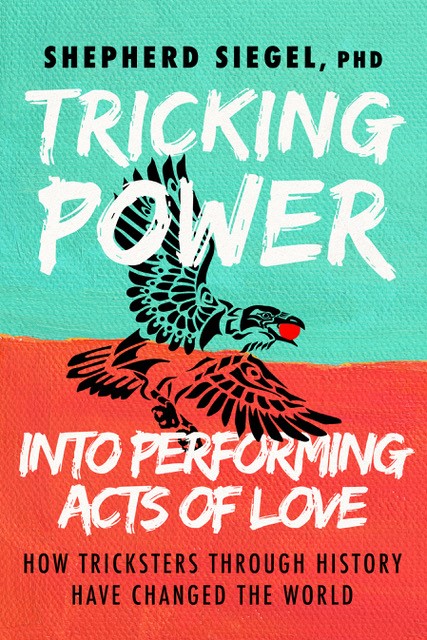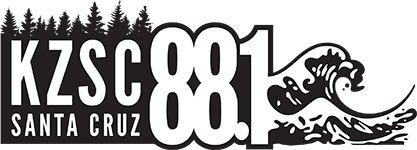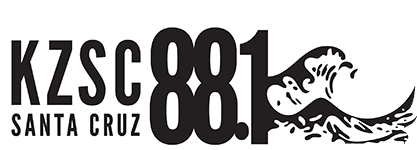
Tricking Power Into Performing Acts of Love: New Book Celebrates Playful Disruption of Dominant Paradigm
By John Malkin —
Shepherd Siegel’s new book “Tricking Power into Performing Acts of Love: How Tricksters Through History Have Changed the World” opens with a quote from Bay Area Beat writer Lawrence Ferlinghetti, “I really believe art is capable of the total transformation of the world.” Siegel highlights artists and activists who have disrupted the status quo like Abbie Hoffman, the Marx Brothers, Mae West, Richard Pryor, Sun Ra, Yoko Ono, Spike Lee, The Yes Men, Earth First! and many others. His first book “Disruptive Play: The Trickster in Politics and Culture” was published in 2018.
Shepherd Siegel lived in Santa Cruz from 1971 to 1982, when his father was the project manager for building Stevenson College at UCSC. Siegel worked for decades in public education and has lived in Seattle for many years. The Sentinel recently spoke with Siegel about social change and the trickster archetype. Tricking Power will be released on May 31st.
INDIGENOUS TRICKSTER
Q: “Your book explores the ways that the trickster archetype can be used to confront power in revolutionary ways. Tell me about the trickster.”
A: “Every indigenous culture on the planet has a trickster god. The indigenous trickster god here in the Pacific Northwest is the Raven. Raven tales extend as far south as Northern California and all the way to British Columbia, the Aleutian Islands and Siberia,” explains Siegel. “The cover of my book has the Raven. He’s a trickster, and he tricks power. The power in the case of the Raven tale is the chief. Here’s a short version of story; the chief is the keeper of the sun, the moon and stars. The world is dark. So, the Raven tricks the chief into releasing the sun, moon and stars into the world. In this case, the trickster god is both a trickster and a liar because he has to play tricks in order to get the chief to give it up. But he’s also a savior, which is one of the paradoxes of trickster-ism. In the words of the great contemporary tricksters – the Yes Men – “We tell lies in order to reveal a greater truth.”
ESHU ELEGBA
Q: “Tell me about the African trickster archetype.”
A: “The trickster god who’s fascinated me the most is Eshu Elegba, who comes from West Africa. It’s the spirit of Eshu that has influenced not just African-American culture, but what I call Afro-Atlantic culture. Everywhere from Brazil – where Eshu was considered a political liberator – to Cuba and the Caribbean,” Siegel says. “And, of course, all the way to the southeastern United States which became this great African American culture.”
SUN RA IS AN ANGEL
Q: “I love that you write, “Music is the most accessible art form. And some would say the most magical.” You highlight jazz artist Sun Ra and refer to his music and space-age fashion as an act of creative resistance.”
A: “The first time I encountered Sun Ra was when he played at the Civic in Santa Cruz in the ‘70s. God knows how I ended up in that auditorium that night! But it was an experience I’ll never forget. And trust me, I’ve forgotten a lot of stuff that happened back then! The band all came out in their space age outfits and it’s this style that George Clinton and Parliament Funkadelic, and more recently, Janelle Monae have borrowed for this Afro Futurist garb.”
Siegel adds, “I don’t see Sun Ra as a trickster. By his own admission, he’s an angel. He also claims not to be an earthling, that he’s more at home on Saturn than on Earth. And I’m cool with that. But the reason he’s included in the book is that he created a spiritual climate around his community of musicians. He invented the DIY approach to making records. In the early days of his band, the only place you could get his records was at his shows. And he was the first guy to popularize a band living in the same house together. They did that in Chicago, New York and Philadelphia and practiced ten hours a day.”
WORST FORM OF PLAY
Q: “Tell me about the different types of play.”
A: “Scholars of play have come up with 308 different forms of play. Original play is this natural state that little babies and animals have. It’s non-competitive; think of it as frolic. It’s being happy to be alive and being playful with others,” Siegel delineates. “And then you get cultural play where that playfulness evolves into a game where you keep score with winners and losers. There’s nothing wrong with that in and of itself. But it’s gotten out of hand. And when it gets completely out of hand, you get the worst possible form of cultural play – war.”

TRICKSTERS ARE ANTI-WAR
Q: “You write, “Tricksters are anti-war.”
A: “From a Jungian perspective, all human beings contain all the archetypes; mother, hero, warrior, trickster, fool, magician, sage. But this country is infatuated with the warrior archetype. We swim in the waters of the warrior. That particular archetype has its positive attributes, but this country has gone way too far in thinking that our problems can be resolved through conflict, by defeating our adversaries. So, it becomes hard to get our arms around other archetypes like the trickster,” Siegel says.
“Being anti-war is the birth of the moral and ethical consciousness of the trickster. But the reason they’re against war is not because they’re good and right and war is evil and wrong. They’re anti-war because they just want to have fun. And there’s nothing on this planet that is less fun than war. You don’t need a religious doctrine and you don’t need somebody lecturing you; you simply know this. When you see the violence and suffering of war, you know, “I’m not going to do that.” The beauty of the Trickster is that they experience moral discovery through experience, not through doctrine or somebody inculcating morality on them. They come to morality through a much deeper sense, by experience.”
RICHARD PRYOR AND GEORGE FLOYD
Q: “You make an interesting connection between comedian Richard Pryor and the May 23, 2020 murder of George Floyd by Minneapolis police.”
A: “There’s this amazing Richard Pryor routine from 1979, where he does a very raw description of the chokeholds that police use on unarmed black men and kill them. In exactly the way George Floyd was murdered. Of course, this had already been going on for decades when Richard Pryor worked it into his routine in 1979. And the power was in that audience, and Pryor tricked that power.” Siegel recalls, “He was speaking to a mostly white audience and he’s saying this like it’s a joke, describing a chokehold that kills unarmed black men. And the audience is laughing. My theory is that people laughed because what Pryor was describing was so uncomfortable. And he planted a seed with that audience. As they’re laughing, they’re asking themselves, “Why am I laughing? This is so absurdly wrong.” And maybe it took forty years for the punchline to be delivered. Because now we have this reckoning where a much larger number of Americans are aware of this kind of police violence. Pryor even talks about how Black folks knew exactly what he’s talking about. But it was news to a lot of white folks. So, he planted a seed. If you think of the white majority in this country as being the power structure, and you think of his not-so-funny joke as a trick, he tricks that power structure into performing the act of love that we’re involved in right now, which is a reckoning with this police practice to make sure it stops happening.”
FLOWER IN A GUN
Q: “How do recent movements to abolish or defund police fit into tricking power?”
A: “Let me start out with the image from the anti-Vietnam War era when the female hippie puts a flower in the barrel of a gun and tries to trick power into performing an act of love. I certainly would like to see our communities work together better.”
Siegel continued, “And your question strikes a nerve with me; I worked in public education for a few decades and the last job I had was as vocational director for Seattle Public Schools. I noticed that when school was over, students were hanging out on the streets getting in trouble with the police. And the police came from blue collar suburbs that are mainly white, while the kids getting in trouble were mainly kids of color. I met with Seattle high school principals and asked, “What about having a criminal justice program in your high school so we can raise our own kids to be the police men and women of the future? They’ll have more insight and understanding.”
The thing that causes me no end of being upset is that some of these high school principals were more comfortable demonizing the police than they were changing the makeup of policing. Seattle now has over 300 vacancies in the police force. And part of the funding is for relocation fees to help police candidates move here from somewhere else. They’re not talking about raising our own police. That may not be as transformative as defunding the police, but it’s a step in the right direction.”
Q: “I like the idea of localizing. But I’m skeptical about improving policing, in the same way I would be skeptical about improving war-making. I’d like to see more unarmed emergency response teams like CAHOOTS in Eugene, Oregon, who respond to 20% of emergency calls instead of police.”
A: “What I hear you saying is; how do we reformulate the power? We need to have some kind of power in our communities, but maybe we should only have it when it’s really necessary. Redirecting police calls to social service agencies makes a ton of good sense,” Siegel agreed. “I’m reading The Dawn of Everything by David Graeber and David Wengrow and I love this line, “Why would we ever let anybody else tell us what to do?” The trouble starts with police when they exert their authority, rightly or wrongly. And especially if you’re Black, you have to bow down to their domination to get the hell out of that situation. That’s just not the right dynamic.”
This interview with Shepherd Siegel was published in the Santa Cruz Sentinel on Thursday, May 25, 2022 and was broadcast the same day on KZSC 88.1 FM / kzsc.org on Transformation Highway.

